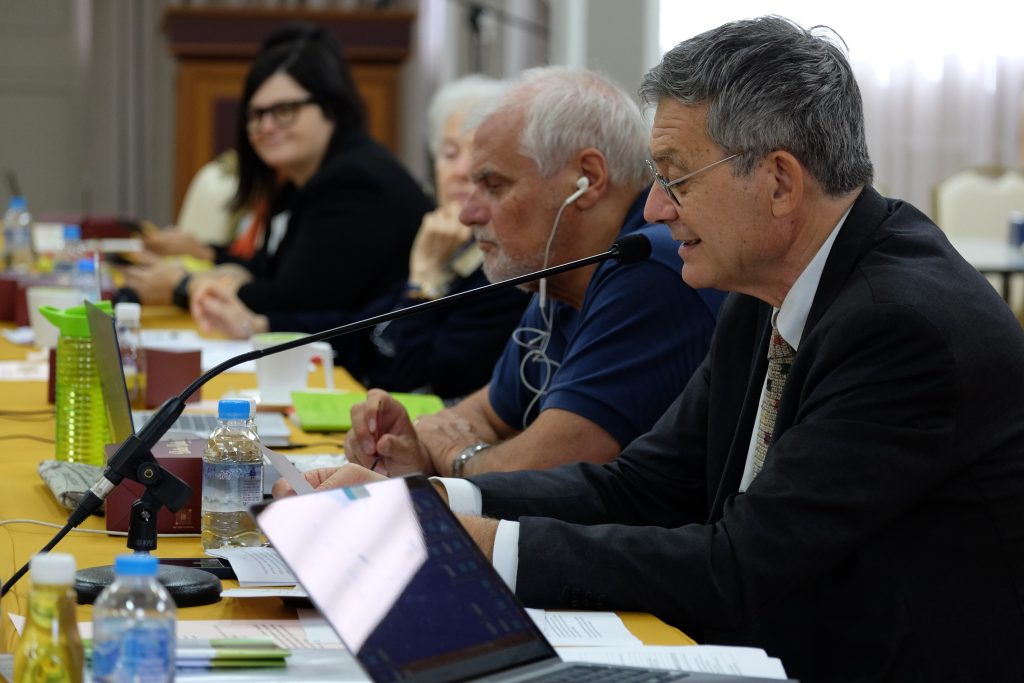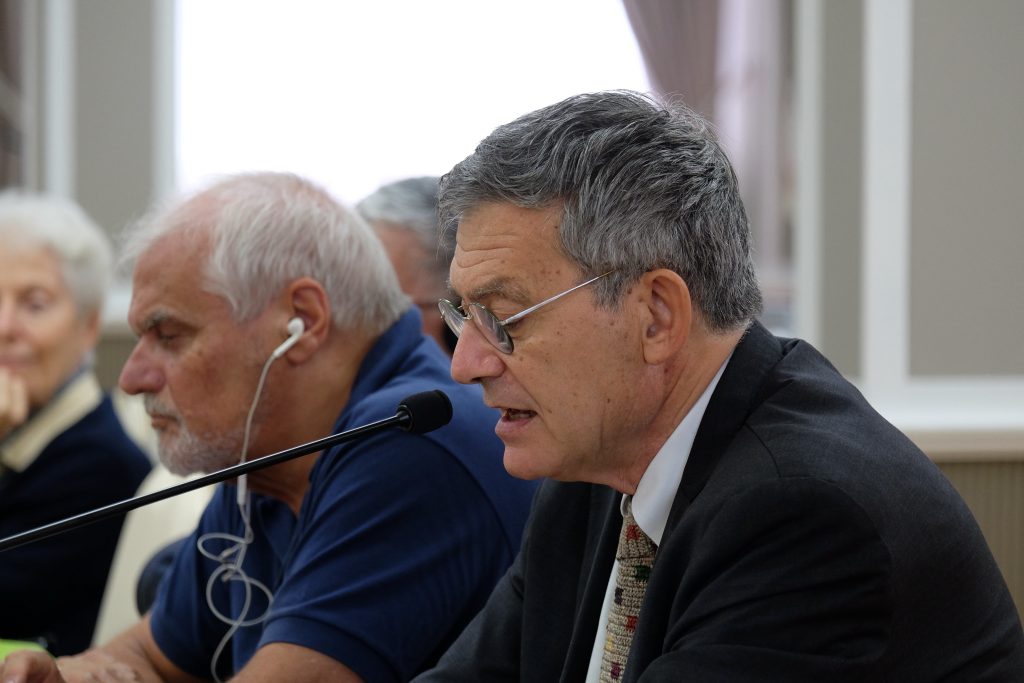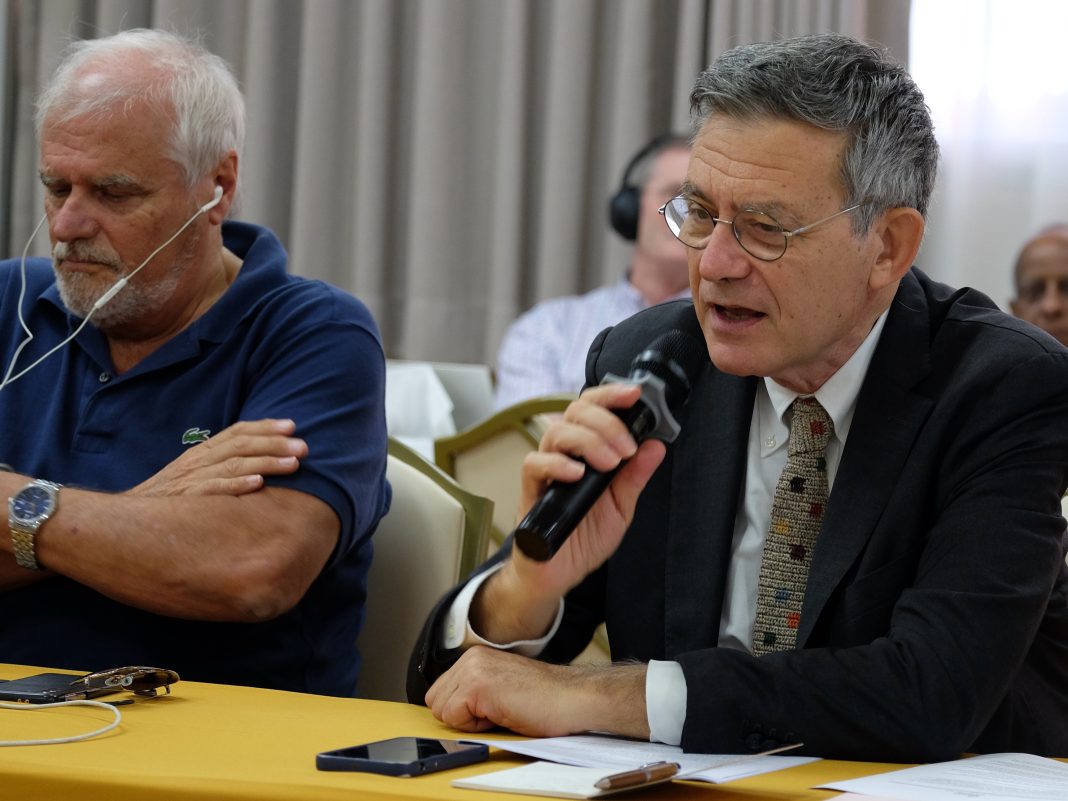From November 25th to the 28th, the capital of Thailand, Bangkok, welcomed the members of the SIGNIS Board of Directors who met for the first time in person since they were nominated. The meeting was an important moment to share the latest updates from the different SIGNIS regions around the world and reflect on how to strengthen the work that is being done. This means engaging more young people in the media, offering more workshops on media production, empowering more women through media training programs and reaffirming our long-standing presence at film festivals around the world, and more.
The participants, who are not only part of the Board but also oversee the activities of the different SIGNIS Desks which focus on different media areas (cinema, television, journalism, digital media, radio and media education), started the working days with an inspiring speech from Dr. Paolo Ruffini, prefect of the Vatican’s Dicastery for Communication, who offered a reflection on the importance of communication not only for the Church but to weave communion among the peoples.
Good morning, and thank you.
You can hardly imagine how important it is to me, how important and meaningful it is to be here with you. Here, in your presence. Here after the first synodal assembly. Here in a time of tribulation that challenges us.
A time that seems to have “lost the way of peace” (cfr. Pope Francis, Prayer for the peace, 27 November 2023); a time that appears incapable to react to ecological crisis that “is crumbling and perhaps approaching the breaking point” (Laudate Deum).
If you are here, if we are here, I think the reason is precisely to ask ourselves: Where are we in this world? Where are we in this time? What do we have to do? Where do we have to go?
If we look at the synthesis document of the synodal assembly to receive an orientation, we can find many inspirations in there also regarding communication in the digital era. That is our field. But the most important inspiration is rediscovering our mission as professional communicators in the widest and out-going possible sense: as a way of connecting journalism, art, literature, music to weave the communion that unites all of us.
What was SIGNIS meant to be if not exactly this?
Not an ecclesial bureaucracy, nevertheless a power, but a communion of servants called to be workers, weavers of a different culture from one, the common one nowadays, based on division.
In this sense we should not think that the expression “digital missionaries” (or any similar expression) means that we are or supposed to be something separated from the people of God.
As Pope Francis writes in Evangeli Gaudium, of which we celebrated yesterday [November 26th] the tenth anniversary:
…every Christian is challenged, here and now, to be actively engaged in evangelization; indeed, anyone who has truly experienced God’s saving love does not need much time or lengthy training to go out and proclaim that love. Every Christian is a missionary to the extent that he or she has encountered the love of God in Christ Jesus: we no longer say that we are “disciples” and “missionaries”, but rather that we are always “missionary disciples”. If we are not convinced, let us look at those first disciples, who, immediately after encountering the gaze of Jesus, went forth to proclaim him joyfully: “We have found the Messiah!” (Jn 1:41). The Samaritan woman became a missionary immediately after speaking with Jesus and many Samaritans come to believe in him “because of the woman’s testimony” (Jn 4:39). So too, Saint Paul, after his encounter with Jesus Christ, “immediately proclaimed Jesus” (Acts 9:20; cf. 22:6-21). So what are we waiting for?
We have to do more, and more, and more … to mature in our work as evangelizers.

Since, as you know, communication is not merely the giving of information, since weaving communion among journalists, film directors, graphic designers, writers, novelists, actors, performers, cultures is itself the most power mean of communication. Here is exactly the challenging and unique task for the men and women of SIGNIS: to be a network that unites, and liberates.
We should take the lesson of the Good Samaritan seriously. Only by strengthening our being a network can we be a point of reference for the cultural debate in each of our countries and manage the potential conflict between freedom and responsibility.
We must be aware and feel the responsibility – facing the ever-increasing insignificance of homologated thought – of how much attention there is towards the Catholic world, towards our ability to restore meaning to things. Towards our capacity to listen and to share. Towards our capacity to be free, to ask questions, not to be resigned or acquiescent.
There are many challenges before us. But one rule describes them all: a missionary creativity is based on love, one that is patient, is kind, that does not envy, does not boast, a love that is not proud. It does not dishonor others, it is not self-seeking …” (Cfr 1Cor 13,4 ss).
This is what the synodal assembly that has just ended told us. Pointing out a route and not a menu to be like good Samaritans in this wounded world.
And also pointing out a great temptation to avoid: the temptation of self-referential pride, often disguised in an apparently seductive dressing up. But “God has scattered those who are proud in their inmost thoughts” (Lk 1:51).
Jesus used stern words against the doctors of the law who “have taken away the key to knowledge”: “You yourselves have not entered, and you have hindered those who were entering ” (cf. Lk 11:52).
I believe this admonition should not be confined to the history of 2,000 years ago. But it also concerns us today.
Let us as communicators, let SIGNIS, not be as these doctors of the law.
Let no one’s door be closed to those who wish to enter.
The rule of the most participative decision-making processes is to “become all things to all people” (cf. 1 Corinthians 9:22),
Let us not rely on functionalism, with the illusion – as Pope Francis says – to “resolve the problems ourselves by ‘covering up’ the situation, of keeping everything under control, of increasing one’s relevance, of making things better. A Church afraid of entrusting herself to the grace of Christ and focusing on the efficiency of her bureaucracy,’ said the Pope in his message to the Pontifical Missionary Works in 2020, “is already dead, even if structures and programmes that favour the interest of “self-absorbed” clergy or lay people linger for centuries.”
Now we all know is not easy in this change of era to understand what the Lord is asking from us. There are so many things we do not yet know.
And so many also those we do not understand. So many that we are not yet able to carry the burden of.
It is all written. We know that we do not know. But there are also many things we do know.
Let us ask ourselves then:
- What is the charism of SIGNIS?
- How can we – speaking about SIGNIS .– detach our service from power and its signs, its worldly symbols?
- How can we be salt of the world of culture and communication?
- Are we savory or bland, tasteless?
- What are we willing to leave in order to respond to the call, and what instead would put us in crisis if asked to give it up?
These are useful questions to understand what we are looking for:
- What are we afraid of?
- What are we attached to?


In the Synod secretariat room, there was a sign “Please, do disturb.” It should be the rule for each and everyone entrusted with decision-making responsibility.
Let us be disturbed by the Spirit and by others. Let us disturb one another in order to do an examination of conscience. Where are we in our journey?
Perhaps, as Father Primo Mazzolari, an Italian priest who died after the Second Vatican Council that he anticipated in his preaching, used to say we too have to understand that it is time to come home:
“What more lessons and experiences we still have to go through in order to understand that we are all prodigal sons? In order to understand that this poor materialistic and calculating world of ours cannot be saved on the level of calculation and quantity?
… Providence is cutting off our moorings.”
Perhaps, to be significant as a synodal Church, we must all die a little to ourselves, to our fears, and recognize ourselves as prodigal children and return to the Father to be free children. This is what the Church needs today: people who are free of themselves and therefore capable of weaving communion.
Poverty should be a constitutive dimension of our being a Church on the road. Without a walking stick and without a saddlebag (cf. Matthew 10:9-10; Luke 9:1-6).
The whole Gospel tells us this: to practice simplicity in our institutions; to seek a missionary creativity that is born of poverty.
This can be done also in the field of communication, of culture, of cinema, of art.
We must not be afraid, we must not think about the costs of this sharing, because it will not be a cost, but an asset. It will not be a burden but an incentive to experience the joy of communion. It will not be a superstructure, but our way of being an outgoing synodal church. With neither gold nor silver, neither walking stick nor saddlebag.
Our challenging time, the dark hour we are living in, is perhaps asking us for a kind of abandonment of control, even a kind of dying. As Pope Francis tells us, we need courage, and freedom when, in the struggles of our souls, we are called to risk. But where there is no risk, there is no fruitfulness.
In Evangelii Gaudium, PopeFrancis wrote: there is no greater freedom than to let oneself be led by the Spirit, to renounce calculating and abandoning everything, and to allow him to enlighten us, to guide us, to push us where he wishes.
Giving up control does not mean doing nothing!
As the Church has been such a structure of control, sometimes a strong intervention in necessary, in order to allow the Holy Spirit to lead us where we never thought we would go.
Let us fly the younger among us. Young people are not called to replace the elderly, but to do what we cannot imagine. Anything new is born overnight. But it is necessary to initiate processes. And to cultivate them.
And while the seed of the new is being planted, it is necessary not to let the tree that generated that seed die.
There must therefore be those who imagine new things and those who manage the heritage of tradition by renewing it. We must be able to show how faith can be a ‘glue’ to rebuild and unite the wounded community. We must also know how to promote the Church as a creative artistic community, that is, recreating the Church in art, music, literature.
There can be ways of being SIGNIS that we cannot even imagine now.
In one of his meditations at the Synod, Father Timothy Radcliff said:
“We must seek ways to speak the truth so that the other person can hear it without feeling harassed.” And to explain himself, he added: “The American poet Emily Dickinson offers us good advice. Tell the whole truth, but tell it obliquely. Success lies in a circuit. The point is that the truth is sometimes spoken with more vigor and force when you do it indirectly, so that the other person can hear it.”
We need concrete experiences of sharing creativity in our mission.
We have to connect people.
And to weave communion among them.
We have to invent new ways to do it.
If the digital is real, communication must have real effects, interacting with people, not only by providing ideas and information, but also by creating an environment conducive to fruitful relations.
Communication means bringing people together.
The real resource that we lack is not information, but trust. An asset that is very difficult to acquire and very easy to lose!
If “the split between the Gospel and culture is without a doubt the drama of our time” (as Paul VI states in Evangelii nuntiandi, no. 20), how can we bring the Gospel back to the world of cinema, television, the Web? How should we live in a contemporary society without losing the way, but on the contrary managing to change one’s perspective?
“What matters, according to Saint Paul VI, is to evangelize man’s culture and cultures (not in a purely decorative way, as it were, by applying a thin veneer, but in a vital way, in depth and right to their very roots” (Ibid.). A new Christian imagination must be created! It is up to us to find a way to bring the Gospel back into the world of cinema, television, web newspapers, social media. Into our polarised and wounded world.
Challenges can only be won together. By walking together. By hoping even when we seem to be hoping against hope.
It is significant to note that the Gospel is interwoven with questions that invite the disciples to set out. Let us not settle for a menu. We need a journey, a way. Let us not settle for a list of things to do. We need a common vision. Let us not rely primarily on organization. Communion is not a catalogue of rules. The love of which we are called to be a servant in the world in culture is not a formula.
We must broaden the concept of communication, so that a cultural change is generated worldwide. We have to unite our efforts. And for this reason, we should have in SIGNIS the writers, photographers, journalists, artists, the people from the world of television and cinema dreaming together, working together to weave a better world.
By listening to one another their points of view can help each one of them to concretely go ahead, to go further.
We are living through a transition of epochs, where journalism is often corrupted by power. It is up to us to serve the truth. To look beyond requires a prophetic gaze. It is up to us, as people of good will, to weave ethics into the future we are shaping, rediscovering the idea that communication, like education, is a public good, and as such must be defended. The future of our democracies depends on it. What we need is a reliable ecosystem that does not sell you or buy you but serves us.
We are already a network. What we lack is the humble and patient creativity of those who do not seek fireworks of a moment, but a faithful relationship. Let us focus on this. Let us work upon it: in networking, in involving the youths; in creating events; in formation; in communication.
We are the ones that can connect creativity of the artist with the service to the truth of the journalist.
Pope Francis reminded us that “as a Latin American writer said, we human beings have two eyes: an eye to see what is before us, and another to see our hopes and dreams. When someone lacks these two eyes, or sees things only with one or the other, something is lost. The ability to see our hopes and dreams… artistic creativity… It is not enough simply to see; we also need to dream. As human beings, we yearn for a new world that we will not see fully with our own eyes, yet we desire it, we seek it, we dream of it.”
SIGNIS – let me use the words of Pope Francis to artists – “can see things both in depth and from afar, like sentinels who strain their eyes, peering into the horizon and discerning deeper realities.”
This is your and our challenge.
Count on our Dicastery on your journey.
In this change of epochs, it is really time to think in a different way.
And to do it together.


